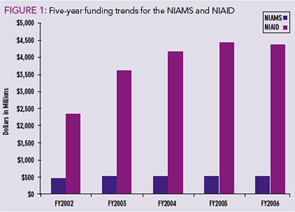This issue raises serious concerns about the future of U.S. biological and medical sciences, because the RO1 grant is an essential contributor to scientific innovation. Recent discoveries have provided potential opportunities for science, but we might not be able to take full advantage of these breakthroughs. It is already evident that the United States’ contribution to science in general and biomedical sciences in particular is decreasing, and federal decreases in funding will accelerate this process.
Trends in Rheumatology Dollars
Arthritis is the leading cause of disability in the United States and nearly 43 million Americans – about one in every five adults – have arthritis or chronic joint symptoms. As the population ages, these numbers will probably increase dramatically. Each year, arthritis costs billions in medical care and indirect expenses such as lost wages. Currently, the budgets for the two institutes that fund the majority of rheumatology-related grants – the National Institute for Arthritis and Musculoskeletal and Skin Diseases (NIAMS), and the National Institute for Allergy and Infectious Diseases (NIAID) – have ongoing decreases in their budget and pay lines.
The NIH is currently operating under a continuing resolution and it is unclear when a final appropriation will be given. Currently, for NIAMS and NIAID, only RO1 grants that fall in the 10th percentile are receiving funding from these institutes. Other types of grants have also seen significant reductions. NIH funding specifically assigned to arthritis research was $380 million in 2003 and gradually fell to about $361 million in 2007. Adjusted for inflation, this is a sharp decrease. Similarly, funding for autoimmune diseases in general fell from $591 million in 2003 to $584 million in 2007. Similar striking trends have been seen for specific systemic autoimmune diseases, such as lupus and scleroderma. While autoimmune diseases affect 10% of the general population, they account for only 2% of NIH funding.
What Can You Do?
- Take a proactive approach and establish contact with your senators and representatives and their staff to advocate for research funding increases. To determine your legislators, go to http://www.rheumatology.org/actioncenter and enter your zip code.
- Contact the ACR Government Affairs Committee to participate as an Advocate for Arthritis: www.rheumatology.org/advocacy/federal/advocates.asp.
- Inform your colleagues, peers, and patients about the current status of federal research funding and encourage them to take a proactive approach.
- Learn more about the ACR’s political action committee (PAC) to enhance rheumatology’s presence on Capitol Hill. Contact Kristin Wormley at [email protected] for more information.


